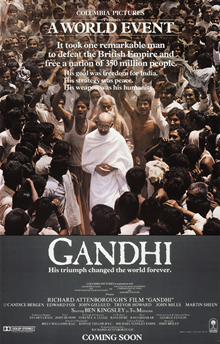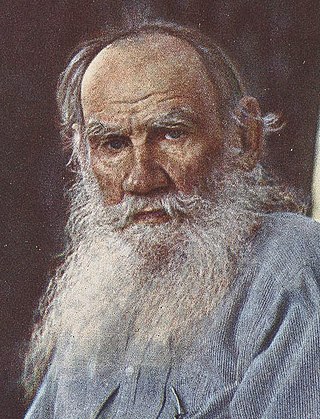
Mohandas Karamchand Gandhi was an Indian lawyer, anti-colonial nationalist, and political ethicist who employed nonviolent resistance to lead the successful campaign for India's independence from British rule. He inspired movements for civil rights and freedom across the world. The honorific Mahātmā, first applied to him in South Africa in 1914, is now used throughout the world.

The Tolstoyan movement is a social movement based on the philosophical and religious views of Russian novelist Leo Tolstoy (1828–1910). Tolstoy's views were formed by rigorous study of the ministry of Jesus, particularly the Sermon on the Mount.

Gandhi is a 1982 epic biographical film based on the life of Mahatma Gandhi, a major leader in the Indian independence movement against the British Empire during the 20th century. A co-production between India and the United Kingdom, the film was directed and produced by Richard Attenborough from a screenplay written by John Briley. It stars Ben Kingsley in the title role. The biographical film covers Gandhi's life from a defining moment in 1893, as he is thrown off a South African train for being in a whites-only compartment and concludes with his assassination and funeral in 1948. Although a practising Hindu, Gandhi's embracing of other faiths, particularly Christianity and Islam, is also depicted.

The Salt march, also known as the Salt Satyagraha, Dandi March, and the Dandi Satyagraha, was an act of nonviolent civil disobedience in colonial India, led by Mahatma Gandhi. The 24-day march lasted from 12 March 1930 to 6 April 1930 as a direct action campaign of tax resistance and nonviolent protest against the British salt monopoly. Another reason for this march was that the Civil Disobedience Movement needed a strong inauguration that would inspire more people to follow Gandhi's example. Gandhi started this march with 78 of his trusted volunteers. The march spanned 387 kilometres (240 mi), from Sabarmati Ashram to Dandi, which was called Navsari at that time. Growing numbers of Indians joined them along the way. When Gandhi broke the British Raj salt laws at 8:30 am on 6 April 1930, it sparked large-scale acts of civil disobedience against the salt laws by millions of Indians.

Kasturba Mohandas Gandhi was an Indian political activist who was involved in the Indian independence movement during British India. She was married to Mohandas Karamchand Gandhi, commonly known as Mahatma Gandhi. National Safe Motherhood Day is observed in India annually on April 11, coinciding with Kasturba's birthday.

Manilal Mohandas Gandhi was the second son of Mahatma Gandhi and Kasturba Gandhi.
Sarvōdaya is a Sanskrit term which generally means "universal uplift" or "progress of all". The term was used by Mahatma Gandhi as the title of his 1908 translation of John Ruskin's critique of political economy, Unto This Last, and Gandhi came to use the term for the ideal of his own political philosophy. Later Gandhians, like the Indian nonviolence activist Vinoba Bhave, embraced the term as a name for the social movement in post-independence India which strove to ensure that self-determination and equality reached all strata of Indian society. Samantabhadra, an illustrious Digambara monk, as early as the 2nd century A.D., called the tīrtha of Mahāvīra by the name sarvodaya.

Sevagram is a town in the state of Maharashtra, India. It was the place of Mahatma Gandhi's ashram and his residence from 1936 to his death in 1948. After Sabarmati, Sevagram Ashram holds immense importance due to the residence of Mahatma Gandhi.

The Story of My Experiments with Truth is the autobiography of Mahatma Gandhi, covering his life from early childhood through to 1921. It was written in weekly installments and published in his journal Navjivan from 1925 to 1929. Its English translation also appeared in installments in his other journal Young India. It was initiated at the insistence of Swami Anand and other close co-workers of Gandhi, who encouraged him to explain the background of his public campaigns. In 1998, the book was designated as one of the "100 Best Spiritual Books of the 20th Century" by a committee of global spiritual and religious authorities.

Kaba Gandhi No Delo is a house and a museum in Rajkot, Gujarat, India. It was Indian independence leader Mahatma Gandhi's primary family home from 1881 to 1915. It is built in the traditional Saurashtrian architectural style and houses a permanent pictorial exhibition called Gandhi Smriti.

Gandhism is a body of ideas that describes the inspiration, vision, and the life work of Mohandas K. Gandhi. It is particularly associated with his contributions to the idea of nonviolent resistance, sometimes also called civil resistance.

Adin Ballou was an American proponent of Christian nonresistance, Christian anarchism, and Christian socialism. He was also an abolitionist and the founder of the Hopedale Community.
Manonmoney Ama Naidoo OLS or Ama Naidoo was a South African anti-apartheid activist.

Kochrab Ashram, also known as Satyagraha Ashram, is a historic site and museum in Ahmedabad, Gujarat, India. The ashram was the first such place founded in May 1915 by Mahatma Gandhi, the leader of the Indian independence movement. For the next two years he lived there with several other members of the movement. Several of his Gandhian ideas were implemented whilst there. In 1953 the site was declared a memorial site by the Bombay State and was handed over to the Gujarat Vidyapith a year later. Its renovation and redevelopment into a museum was completed in 2024.
Gandhian economics is a school of economic thought based on the spiritual and socio-economic principles expounded by Indian leader Mahatma Gandhi. It is largely characterised by rejection of the concept of the human being as a rational actor always seeking to maximize material self-interest that underlies classical economic thinking. Where Western economic systems were based on what he called the "multiplication of wants," Gandhi felt that this was both unsustainable and devastating to the human spirit. His model, by contrast, aimed at the fulfillment of needs – including the need for meaning and community. As a school of economics the resulting model contained elements of protectionism, nationalism, adherence to the principles and objectives of nonviolence and a rejection of class war in favor of socio-economic harmony. Gandhi's economic ideas also aim to promote spiritual development and harmony with a rejection of materialism. The term "Gandhian economics" was coined by J. C. Kumarappa, a close supporter of Gandhi.

Count Lev Nikolayevich Tolstoy, usually referred to in English as Leo Tolstoy, was a Russian writer. He is regarded as one of the greatest and most influential authors of all time. He received nominations for the Nobel Prize in Literature every year from 1902 to 1906 and for the Nobel Peace Prize in 1901, 1902, and 1909.

Hermann Kallenbach was a Lithuanian-born Jewish South African architect who was one of the foremost friends and associates of Mahatma Gandhi. Kallenbach was introduced to the young Mohandas Gandhi while they were both working in South Africa and, after a series of discussions, they developed a long-lasting association.

The Cathedral of Saints Constantine and Helen is a historical Greek Orthodox Church in Johannesburg, designed by architect Hermann Kallenbach and built in 1912. It is a SAHRA protected site.

Shimon Lev (Low) (Hebrew: שמעון לב; born August 1, 1962) is an Israeli multidisciplinary artist, writer, photographer, curator and researcher in the fields of Indian Studies, art and literature, religion, and travel. He holds a Doctoral degree on the subject of the mutual influence of the Jewish and Indian cultures. Lev teaches at the Hadassah Academic College.
Mahatma Gandhi's statements, letters and life have attracted much political and scholarly analysis of his principles, practices and beliefs, including what influenced him. Some writers present him as a paragon of ethical living and pacifism, while others present him as a more complex, contradictory and evolving character influenced by his culture and circumstances.

















